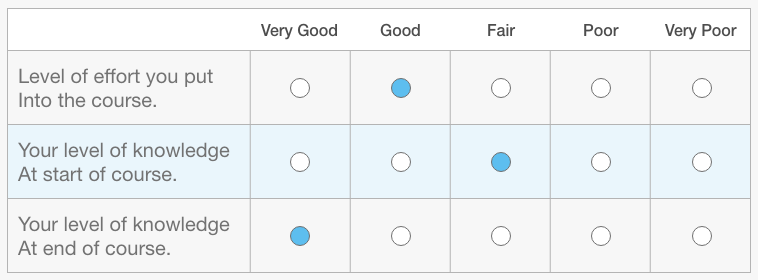
How do you ensure the quality and effectiveness of your courses? By conducting the course evaluation survey, which will provide you with enough feedback from the students. After all, you are creating evaluation courses for the students.
Creating a course that caters to the student’s requirements consumes a lot of time and effort. You may want to know if students can completely understand your course, or maybe you added something new to the course, and you want feedback on it. Without assessing the level of understanding, it’s no use moving ahead.
Whether you are teaching at school, college, or university, a course evaluation survey is an important step in identifying difficulty areas of student learning.
What Is a Course Evaluation Survey?
Course evaluation surveys are used to capture feedback from students. This feedback is then used to evaluate the courses and implement the same to bring further improvement or bridge any gap.
Usually, the facilities/educators roll out these course evaluation surveys to the students at the end of the semester or term. This is the best way to understand the students’ responses.
This survey largely includes course evaluation survey questions that students have to answer to their best understanding. These questions can be about the teaching methodology, subject matter expertise, overall course structure, etc. These questions can be designed in general or specifically tailored to certain criteria.
Primarily, there are two elements that educators consider while creating course evaluation surveys for students. These are:
1. Basic Information
Sometimes, educators just want to focus on a course’s basic information. These evaluation survey questions won’t highlight anything in particular but largely will depend on the overall basic information of a course. These questions will highlight the responses of students to the teaching structure, classroom environment, basics of the course, etc.
2. Multiple Question Formats
A course evaluation survey shouldn’t restrict itself to just one single-question format. This will look uninteresting. Including more than one set and format of questions will increase active participation, resulting in better response rates. The students will have more liberty to explain and express their thoughts and opinions.
A mix of the rating scale, binary format, etc., will allow everyone to participate and answer.
-
Short Answers
The question here will sum up in short answers only. The answer should not consume more than two sentences. The educator should limit characters to the answers to keep an optimum length of the answers.
-
Extended Answers
These answers come with no restrictions. Students can explain any topic in detail. Such questions are generally put in the last when the students are done with most of the course evaluation survey questions, and educators want them to answer in detail. It’s a good way to understand the students’ feedback in more than just a few sentences.
-
Rating Scale
Rating scale is the easiest and consumes less time. Usually, students have to rate any topic on a scale of 0 to 5 or 0 to 10. Or at times, these may include terms like strongly agree or strongly disagree. This way, students can express their opinions on any question.
Other than these common formats, there are certain different types of questions that focus on general concepts. These can highlight anything in particular or contain general situations. These questions also add to the overall feedback to create actionable data.
The Anonymity of Course Evaluation Surveys
It’s better to keep these surveys anonymous. A good thing about conducting surveys anonymously is that it lets the students answer fearlessly. Anonymity creates trust among the students, and they are more open to participation.
Educators can get honest answers this way from the students. And it also builds a bonding between the educator and the students. Students can answer the evaluation survey in their comfort.
If there is no trust among the students, educators are likely to receive compromised answers, which leads to impure and inaccurate data. This whole process will end up in a waste of time and resources. Thus, course evaluation surveys should be independent and anonymous.
Top Course Evaluation Survey Questions for Students
The right course evaluation survey questions will fetch you the right feedback and improve course quality. This further will enhance how engaging and effective your course is.
Here, we will discuss some top course evaluation questions to ask students. We have divided these questions into different categories for better understanding. You can either use the sample course evaluation survey questions mentioned here or mix them with your original questions.
Educator-Targeted Questions
Here are some evaluation survey questions that highlight the educator’s effectiveness in the classroom. You can use these instructor evaluation questions or add your own.
- The educator was fully prepared for the class.
- The educator was able to present all the necessary skills.
- The educator was able to resolve any queries or questions the students had.
- The educator was able to explain all the concepts clearly.
- The educator implemented a teaching methodology to enhance learning.
- The educator utilized their time in the class effectively.
- The educator motivated students to participate in class discussions.
- The educator communicated transparently in the class.
- The educator used effective teaching strategies.
- The educator transparently explained syllabus concepts.
- The educator shared the necessary information/guidance needed during class.
- The educator helped me gain interest in the subject.
- The educator focused on feedback.
- The educator was easy to approach and talk to.
- The educator focused on every student’s performance.
- The educator gave time to each student.
Course-Oriented Questions
Here are some course survey questions to understand how effective the course is.
- The course syllabus clearly explained the learning outcomes and expectations.
- The course clearly structured the topics.
- The topics covered in the course are important.
- The course structure helped me a lot in learning and understanding the syllabus.
- The course was structured with a perfect balance of practice and theory.
- The course followed the entire syllabus without leaving any topic.
- The assignment and lecture were in perfect sync with each other.
- The course clearly stated instructions and explanations.
- I received learning materials that helped me in increasing my knowledge.
- The course assignments assessed my learning so far.
- The readings and resources aligned with each other.
- The exams clearly measured how much I had studied so far.
- The course requirements and workload were appropriate for the course level.
- The course assignments were reflective of the course syllabus and content.
- The course clearly laid out explanations and instructions.
- The course and syllabus were in sync with each other.
Student-Oriented Questions
These course evaluation questions highlight the students’ approaches.
- The course enabled me to think about the subject matter in depth.
- I improved my interaction ability with others using this course.
- This course taught me to take responsibility and accountability for my learnings.
- I attended all classes regularly with full dedication.
- I learned how to become a competent professional with this course.
- I started to ask my questions and look for answers after this course.
- I improved my presentation and communication skills with this course.
- I was well prepared for this course.
- I was able to improve my critical thinking skills using this course.
- I was able to improve my writing skills with this course.
- The course helped me a lot in advancing my understanding and knowledge of the subject matter.
- I learned to put theory into practice using this course.
- I learned my problem-solving skills using this course.
- I was able to enhance my subject matter interest with this course.
- I gained the confidence to research more advanced topics with this course.
- This course helped me improve my overall knowledge and skill set.
Evaluation-Oriented Questions
This online questionnaire contains course evaluation survey questions that highlight the overall evaluations.
- I would love to recommend this course to my fellow students.
- I would highly recommend this educator to my classmates.
- I am fully satisfied with the teaching methodology.
- I am fully satisfied with the course structure.
- The course fulfilled all the expectations I had with this course.
- The course fulfilled all the expectations I had with this educator.
- I found the course a bit challenging.
- The course enabled me to think about the subject matter in depth.
- I believe I made the right decision in doing this course.
- I believe such courses should be conducted regularly.
- I believe this course was a stepping stone in educational as well as professional growth.
- I believe the course material was perfectly designed and structured.
- I believe this educator was well prepared for the course.
- This course should have more practical activities.
- This course should include more analytical skills.
- This course contained all the necessary case studies and examples for better understanding.
Open-Ended Questions for Qualitative Analysis
These sample course evaluation questions allow the students to express themselves in detail rather than just filling out the survey like a machine.
- What made you apply for this course?
- Did you face any challenges with the course?
- Which of the reading materials were highly helpful and which were least helpful?
- Which elements of the course do you believe need improvement?
- Do you believe the instructor was able to identify the key challenges?
- Can you recommend a few ways to improve this course further?
- How well did the course help you learn the subject matter?
- Did you start losing your interest in the course towards the end?
- What did you like most about this course?
- Do you have any suggestions for the instructor of this course?
- Do you have any suggestions for the student who is planning to opt for this course?
- Were course materials/resources up to date and easily available/accessible?
- What, according to you, was the most boring part of the course?
- Do you have any suggestions on the course duration?
- How well did the course help you achieve your targets?
- Do you want to apply for such courses in the future? If yes/no, why?
Questions for Arts Courses
As an instructor, you should also focus on the course’s nature and its questions. Therefore, you should also include course evaluation survey questions that target specific backgrounds. Some questions to include are listed below:
- I learned how to present my ideas artistically.
- I learned to improve my writing skills.
- I improved my reading and critical ability skills.
- I improved my communication and presentation skills.
- The course was a perfect mix of interesting and relevant materials.
- I was able to deliver constructive feedback to my peers.
- I was able to create original work.
- The instructor respected me and my work.
- The instructor challenged me to develop my skills and abilities.
- The instructor articulated the performance standards to the fullest.
Questions for Science Courses
Science courses are interesting. An evaluation survey for science students should also be interesting at the same level. There’s a lot of experimentation, lab work, fieldwork, etc., involved in science classes.
Here are some questions for science class students.
- The course lab helped me understand the lecture material better.
- The lectures and course lab complemented each other.
- The instructor used fair and standard methods of evaluating lab reports.
- The lab was equipped with quality tools and equipment.
- All the lab safety protocols and measurements were practiced.
- The lab instructor supported me with everything in the lab study.
- The lab instructor was well aware of all the equipment and handling.
Some questions that don’t include lab courses but are important for science students
- The science courses were delivered in various methods such as lectures, practical video tutorials, readings, etc.
- I found the course perfectly intellectually challenging for me.
- The course involved fieldwork that took place outside the classroom setting.
- I understood a lot of ethical concerns learning this course.
- The course helped me improve my subject matter knowledge.
So now, you must have understood how nicely and deeply such questions highlight the scope and nature of the course. The output of such questions helps the instructors understand if the course was provided sufficiently and if the course addressed all the ethical and practical issues thoroughly.
Questions for Business Courses
The students can learn a lot about the administrative, ethical, financial, legal, etc., aspects of the business with such courses. You can consider including the following online course evaluation questions:
- The instructor was able to channel positive discussion in the class.
- The students received helpful feedback on exams and assignments.
- The assignment helped me with my subject matter knowledge.
- I was able to develop my collaboration skills with this course.
- I could identify topics related to business responsibilities and ethics.
- I learned about qualitative and quantitative tools with this course.
- I was able to enhance my communication skills in both written and verbal aspects.
These questions highlight the key areas of business and help the students understand the subject. These questions help the instructor find out if the course developed the collaborative, communication, and ethical skill set of the students.
You can also include some training course evaluation questions to gauge deeper.
- Did the training material meet your expectations?
- Did the course include presentations and activities?
- How would you rate the quality of the instructor?
- Did you learn anything new from the course?
- Did the training material match your requirements?
Tips for Creating Course Evaluation Surveys
So you have created a course evaluation survey. But have you thought about the outcomes? Have you thought about the motive of this survey? Have you thought about the information and its use? What do you wish to learn from the results, or what is your end goal?

Maybe you just want to understand how effective the course material is. Or maybe you want a deep understanding of the teaching methodology used by the teachers/instructors.
You must ensure that the course evaluation survey you create should have questions that are clear, concise, and to the point. Misleading or confusing questions will result in incorrect answers only.
When it comes to creating course evaluation surveys, ensure that you follow certain guidelines which will help you design an effective evaluation survey.
Let’s look at the top strategies for creating an effective course evaluation survey.
1. The Questions Should Be Simple, Direct, and Clear
This evaluation survey will contain several questions. Therefore, these questions must be designed to capture desired feedback. Putting direct, to-the-point questions will save you and your students time and effort.
When collecting feedback on the teaching style or course structure, asking questions related to how the course syllabus helped the students achieve their academic goals, how the teaching style engaged them more, etc., gives more insights into the scenario.
Following a clear and transparent questioning approach will avoid any sort of misinterpretation. It further will also eliminate any chances of variations in the responses. One question should focus on one topic/issue. Avoid clubbing two questions into one.
2. The Questionnaire Should Include Multiple Styles
If you include one single set of questions, your respondents will not be interested at all. A combination of different question styles brings engagement. Thus, include questions in different formats, such as rating scale questions where you need specific responses, multiple responses as well as single response questions, etc.
For short questions, you can use open-ended questions. These questions help you capture general feedback regarding a particular subject. Similarly, you can include quantitative and qualitative questions. Such questions speed up the survey response process and save time. Also, you will get accurate and insightful data.
3. Make Evaluations Short & Online
Keeping the process short generates better results. The students are more inclined towards a shorter evaluation process. Thus, a short evaluation process leads to higher survey response rates.
Keeping the survey online ensures that every student can participate in the survey conveniently. Creating a portal where students can access the survey will save time and effort. Students can access online surveys on any device they have (laptop, smartphone, tablet, etc.). You can share the survey link via email with the students.
When the students have enough time to complete the survey, they tend to put credible information and accurate answers. They can feed in their best responses.
4. Define the Rating Scales Clearly
While including the scaled answers (rating scale, i.e., 1-5), it is better to clearly define the rating of the numerical scale under each category. Doing so will avoid any scope of confusion. The survey won’t result in inaccurate data.
Keeping a clear value of the rating scale also removes any chance of skewed results. Let’s take this example to understand this in a better way.
The instructor was able to answer all the questions and resolve your queries.
- Very Good
- Good
- Neutral
- Poor
- Very Poor
5. Evaluation Responses Should Be Confidential
One of the biggest challenges students may face while responding to a survey is the confidentiality of their responses. Thus, communicating to them well and transparently that the course evaluation survey responses will remain confidential and will not be shared with anyone will give them trust and a sense of comfort.
When students are assured that the survey is totally confidential, they are likely to put their best efforts into responding to the surveys. This also increases the survey response rate and the quality of answers. This results in better survey results and a higher degree of evaluation responses.
Ensure that the survey should be sent at a time that suits your students. Also, you should ensure that you share the course survey questions at different stages of the course. If you send the survey after the course completion, you will lose many insights. Therefore, it’s better to define the rating of the numerical scale under each category clearly.
FREE. All Features. FOREVER!
Try our Forever FREE account with all premium features!
Enhance Course Effectiveness With Course Evaluation Surveys
One of the best ways to improve the course is by receiving valuable feedback from the students. Instructors can capture students’ feedback through course evolution surveys.
Course evaluation surveys help the instructors learn what students think about the course. Having a well-organized evaluation process results in insights that instructors can implement to further improve the quality of the course.
Creating a course evaluation survey from scratch can be a tiring process, especially when you are doing it for the first time. Or maybe, you need something extra in the survey. Something more that can engage your students and provide you with in-depth results to help you shape your course effectively.
Today, the market has an abundance of course evaluation survey tools. However, not every tool will fit your requirements. You need a robust and advanced tool that is online, versatile and offers a range of features.
ProProfs Survey Maker is an advanced tool that helps you create online course evaluation surveys from scratch without too much hassle. The tool comes with a library of 100+ expert-designed survey templates and 100+ ready-to-use survey questions that you can include in your evaluation survey.
FREE. All Features. FOREVER!
Try our Forever FREE account with all premium features!

 We'd love your feedback!
We'd love your feedback!
 Thanks for your feedback!
Thanks for your feedback!







